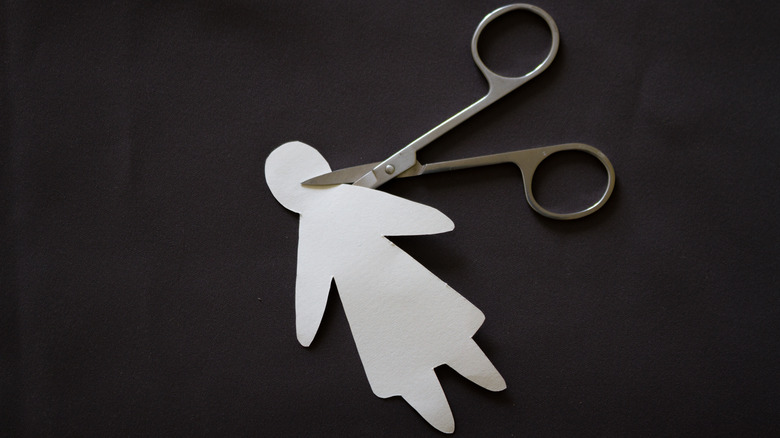What Really Happens To Your Body When You Are Decapitated
Whether severed from your body as the result of an execution being carried out or as the horrible outcome from a tragic accident, your body goes through a lot of rapid changes when your head has been forcefully removed. No brain means no messages to keep your heart beating and your other organs from failing. No body means no blood supply to the brain (via STSTW Media). It's a hopeless case of co-dependence.
What is it like to lose your head? Is it a quick death? Is it a painless way to go? And is it possible for you to still be able to use any of your senses once your head has been lopped off of your body? For those that are morbidly curious, medical science and technology have been able to answer these questions for us, as well as being able to dispel certain myths about losing one's head.
All of the feels
Let's assume for this exercise that your beheading is going to be as swift as possible. Whether that's accomplished by the blade of a guillotine or by the strong arms of a medieval axman really doesn't matter. What does matter is the intense explosion of pain that is about to coarse throughout your entire body.
The pain you experience will last between two and seven seconds (via Salon). The blood flow almost immediately ceases, so your vital organs are now starved of this oxygen rich fluid that they need to function and survive. Without this oxygen, your body goes into an almost immediate cellular death. Likewise, your brain relies on oxygen for its neural networks to function. Without blood carrying oxygen to it, the brain will quickly die.
Being able to prove how much pain you'd endure, and how long the pain lasts, wasn't something that could be asked of those who were victims of beheadings. While there are recorded accounts of eyes opening and closing afterward, as well as a faces reddening, modern medicine chalks that up to the twitching and nerve reactions your body would experience by sudden trauma. What we can assume about the immediate aftermath of a beheading comes from a 2011 experiment that four Dutch scientists performed on mice (via STSTW Media).
The mice had electroencephalography (EEG) wires attached to their brains, so that electrical activity could be monitored. After beheading, the mice registered electric activity in their brains of between 13 and 100 HZ for about four seconds. This range falls within the amount needed for cognition, meaning these mice sure felt all the feels for what must have felt like an eternity.
Brain activity was further observed at much lower levels (below cognition) for up to 80 additional seconds.
Humane and messy
Many experts agree that beheading is the most humane form of execution, if it is properly performed (via Viral Nova). Of course, it's an easy form of capital punishment to botch, if you're getting your head lopped off by a clumsy axman or by a dulled machete. This, of course, would prolong the physical agony, not to mention the intense amount of anxiety your body would be experiencing.
As humane as some people claim beheading is, it's not a standard form of capital punishment used in the Western world today. The primary reason is how messy decapitation really is. Your heart would still be beating for a few moments after your head is severed, forcing blood to be pumped a bit longer. This blood gushes out of your neck stump in great spurts, going everywhere (via Viral Nova).
While any form of execution is a rough way to go, maybe it's best most developed nations have abandoned this one to the ages.


